Porto engineering wins international robotics competition in Italy
ISEP-INESC TEC team wins 1st place in Eurathlon Grand Challenge
A team of INESC TEC researchers and students from the Porto School of Engineering (ISEP) won the Eurathlon Grand Challenge in Piombino, Italy, an international competition of robots used for search and rescue operations, which took place between 17 and 25 September. The ISEP-INESC TEC Aerial Robotics Team participated in the competition with aerial robots and, in the final challenge, they competed in partnership with an underwater robotics team from the University of Girona, Sapin, and with the German company which competed with land robots.
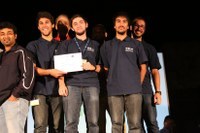
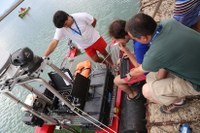
INESC TEC reserachers also won 2nd place in the competition
The Portuguese participation also featured a team of researchers from INESC TEC’s Centre for Robotics (in collaboration with ISEP and the Faculty of Engineering of the University of Porto) – the ICARUS team – which presented maritime robots, having won second place in the final test with the underwater robot MARES and the surface robot ROAZ. It is important to stress that this last team included reseachers who are working on the European search and rescue project, as well as researchers from five European institutions.
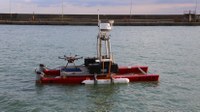
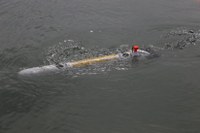
“We were invited to participate in this competition with robots that operate in water scenarios through European project ICARUS. Our robots support search and rescue operations in large catastrophe scenarios”, explains Aníbal Matos, researcher at INESC TEC and professor at FEUP, who participated in the euRathlon.
The ICARUS (Integrated Components for Assisted Rescus and Unmanned Search Operations) is a European project that brings together 24 partners from nine countries – Portugal, Spain, France, Germany, Belgium, Switzerland, Italy, Austria, Poland –, with a budget of 17 million euros. The project started in February 2012 and will be concluded in January 2016.
The goal with this project is to develop robotic tools that will aid search and rescue teams, and can be used both on land and at sea. These robots are innovative because they can be used in crisis scenarios, such as in natural disasters.
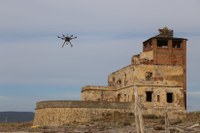
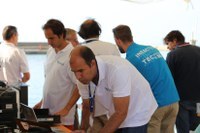
What is the euRathlon Grand Challenge?
Organised by an international consortium, the Eurathlon Grand Challenge featured 18 teams from 21 countries, in a total of 150 participants. For the first time worldwide, this robotics competition consisted of simulating a search and rescue scenario inspired by the nuclear disaster in Fukushima, Japan, involving land, air and underwater robots.
The Portuguese participation in this international mega challenge – the Eurathlon Grand Challenge – was a demonstration of Portugal’s innovative engineering. Other than winning first and second places, the national teams have also won additional awards in technical competitions and other scenarios.
The INESC TEC researcher mentioned in this article is associated with the following partner institution: INESC TEC, FEUP and ISEP.


